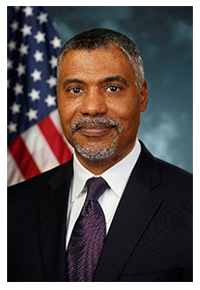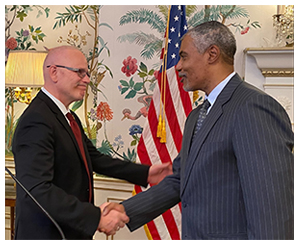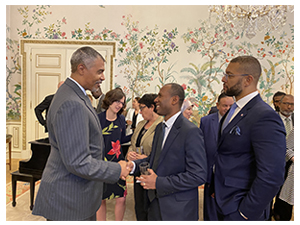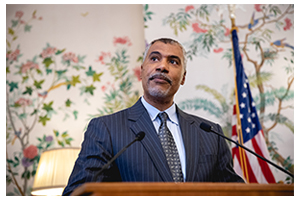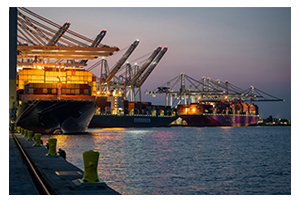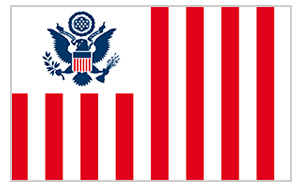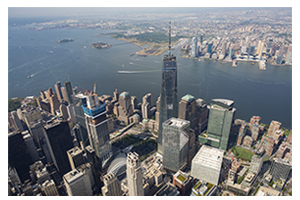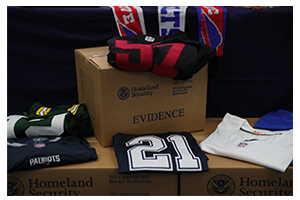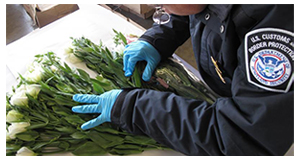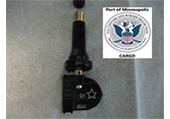In this Update
Message from the Deputy Assistant Commissioner
CBP Access is an electronic newspage developed by the Office of Congressional Affairs for Members of Congress and staff. If you are interested in subscribing to the CBP Access email distribution list, please send an email to OCAInquiry@cbp.dhs.gov.
CBP recently announced its intent to nominate Ian Saunders for World Customs Organization (WCO) Secretary General, a position held by Japan’s Kunio Mikuriya for the past fifteen years. The United States has a long-standing relationship with the WCO, the only intergovernmental organization exclusively focused on customs and border security matters. CBP serves as the United States’ lead representative to the WCO and is responsible for preparing, coordinating, and advocating U.S. positions on global customs matters, in close partnership with other federal agencies and private sector stakeholders. This CBP Access update provides a primer on the WCO and how CBP is leading enforcement and facilitation efforts in the global customs community.
–Stephanie Talton, Deputy Assistant Commissioner, Office of Congressional Affairs
CBP Announces the United States' Intended Nominee for WCO Secretary General
CBP announced on Saturday its intention to nominate U.S. Department of Commerce International Trade Administration Deputy Assistant Secretary Ian Saunders to become the next Secretary General of the World Customs Organization (WCO).
As the U.S. Government’s intended nominee for the WCO’s most senior position, Saunders will stand for election at the June 2023 WCO Council meeting. If elected by a majority of the 184 customs Directors General who comprise the Council, Saunders will become the first American official to serve as WCO Secretary General since 1999.
“Ian Saunders is a deeply respected member of the global customs community who represents the very best of America’s public service,” said CBP Commissioner Chris Magnus. “Ian’s customs and trade expertise, strategic thinking, and diplomatic acumen make him uniquely suited to lead the WCO in this time of rapid global change.”
At an event in Brussels where the announcement was made, Deputy Assistant Secretary Saunders pointed to the WCO’s rich history of solving complex, global customs challenges as his inspiration to pursue the Secretary General position. Saunders discussed his intention to build on that tradition by accelerating the implementation of existing WCO tools, harnessing new technologies, ensuring good governance, and further enhancing customs capacity-building efforts.
“The global customs community finds itself at a critical moment. Perhaps at no other time has customs’ central role in trade, and our well-being, been more clear. The importance of the WCO is equally clear, as it will need to continue supporting its members as they manage pandemic-induced supply chain disruptions, respond to the effects of a changing climate, and prepare for other potential challenges,” said Deputy Assistant Secretary Saunders. “As Secretary General of the WCO, I will focus on the organization providing thought leadership and tools that enable the global customs community to deliver a safe, prosperous, and inclusive future.”
“The global customs community finds itself at a critical moment. Perhaps at no other time has customs’ central role in trade, and our well-being, been more clear. The importance of the WCO is equally clear, as it will need to continue supporting its Members as they manage pandemic-induced supply chain disruptions, respond to the effects of a changing climate, and prepare for other potential challenges,” said Deputy Assistant Secretary Saunders. “As Secretary General of the WCO, I will focus on the organization providing thought leadership and tools that enable the global customs community to deliver a safe, prosperous, and inclusive future.”
Deputy Assistant Secretary Saunders has more than 30 years of experience in customs and international trade. He began his career at the former U.S. Customs Service in 1991 and worked his way up to leadership roles in the Senior Executive Service. While serving as Assistant Commissioner of the CBP Office of International Affairs, Saunders led multiple U.S. delegations to the WCO and chaired the organization’s influential Permanent Technical Committee from 2018 to 2020.
In his current position as Deputy Assistant Secretary at the U.S. Department of Commerce International Trade Administration, Saunders is responsible for developing programs, policies, and strategies to strengthen commercial cooperation in the Western Hemisphere. Saunders speaks Spanish and Portuguese and holds bachelor’s and master’s degrees from the Georgetown University School of Foreign Service.
CBP is the agency responsible for coordinating U.S. Government engagement with the WCO. The United States joined the WCO in 1970 and has been a leader in developing and implementing the SAFE Framework of Standards and other WCO tools that secure and facilitate international trade. Although the United States is an active participant in numerous WCO working bodies, a U.S. official has not led the organization since James Shaver of the former U.S. Customs Service served as Secretary General from 1994 to 1999.
The WCO is the independent, international body dedicated to improving the effectiveness and efficiency of customs administrations. The organization’s 184 members collaborate to establish standards and instruments that reduce the costs of international trade, facilitate the cross-border flow of essential goods, and protect society from unsafe products.
The WCO: A Primer
WCO History and Mission
The WCO emerged with the end of World War II in the mid-20th century and a desire among trading nations to create a standardized tariff nomenclature and valuation system. The Convention establishing a Customs Co-operation Council (CCC), the official name of the WCO, entered into force in 1952 with 17 Contracting Parties. The inaugural session of the CCC Council was held on January 26, 1953 – a day now celebrated as International Customs Day. Today, the WCO (the working name adopted in 1994) represents 184 customs administrations divided into six regions across the globe that collectively process approximately 98% of world trade. Headquartered in Brussels, Belgium, the WCO is the recognized voice of the global customs community.
Since its establishment, the WCO has provided leadership in expanding the avenues of international trade and security. The organization’s successes have advanced several activities, including –
- development of global standards,
- simplification and harmonization of customs procedures,
- security of supply chains and facilitation of international trade,
- enhancement of customs enforcement and compliance activities,
- creation of anti-counterfeiting and piracy initiatives,
- advancement of public-private partnerships,
- promotion of integrity, and
- enhancement of sustainable global customs capacity building activities.
Present-Day Governance and Structure
The WCO recognizes the evolving challenges and expanding responsibilities customs administrations face today. The WCO relies on collaboration among customs partners, both in the private and public sector, and aims to facilitate cooperation between WCO members at varying states of economic development. All WCO Heads of Customs are part of the Council, which establishes committees, working groups, and technical groups as needed, to examine issues and propose solutions through tools, agreements, and other vehicles.
The WCO Secretariat, led by a Secretary General, oversees WCO’s daily operations and supports the Council and its working bodies to deliver capacity building, training, technical assistance, and the development of customs tools. The Secretariat is organized into three Directorates:
- Tariff and Trade Affairs - responsible for classification, valuation, and origin;
- Capacity Building - responsible for technical assistance and organizational development; and
- Compliance and Facilitation - responsible for procedures and facilitation, enforcement, and compliance.
Working out of WCO headquarters, the Secretariat performs several activities, including implementing Council decisions, instruments, and tools; supporting working bodies; translating and publishing reference, training, and promotional documents; providing events and training for customs officers and the private sector; and performing research and policy analysis.
CBP and the WCO
The U.S. Customs Service – a legacy CBP agency – traces its origins to 1789, when the First Congress of the United States passed three acts that provided for administering customs tariffs and collecting duties. Over the years, the role of U.S. Customs Service, and now CBP, has expanded from its traditional revenue collection role to managing additional government activities such as interdicting prohibited goods and substances; protecting domestic industry, public health, and safety; advancing economic prosperity through trade facilitation; securing supply chains; and enforcing intellectual property laws. Furthermore, CBP is trusted with enforcing laws and policies for which other federal agencies have responsibility, such as agriculture, health, and environment.
As the United States’ lead representative for engagement with the WCO, CBP is an active participant and leader in WCO activities including global customs operations and the drafting and approval of best practices, guidelines, and standards with the goal of –
- increasing the international exchange of customs information and intelligence;
- enhancing the essential tools and instruments of the organization;
- promoting CBP’s security and trade facilitation and trade enforcement objectives;
- increasing efficiency and predictability for U.S. business and industry;
- supporting the delivery of capacity building and integrity practices so that other administrations can engage in effective enforcement activities that enhance our own security; and
- enhancing the governance and administration of the organization.
CBP is a thought leader within the WCO and a leading contributor of capacity building and expertise to the organization and its members. U.S. delegations shape the strategic direction of the WCO through participation in dozens of the organization’s meetings, trainings, operations, and events each year. The United States holds a seat on the limited membership Policy Commission, which is the WCO’s executive steering group, and the limited membership Finance Committee, which determines how the organization’s finances are managed.
International Standards
One of the most important U.S. achievements within the WCO has been the establishment and continued promotion of the WCO’s SAFE Framework of Standards to Secure and Facilitate Global Trade (SAFE Framework). Standards on customs procedures bring transparency, efficiency, and predictability to trade operators, enabling them to reduce compliance costs. Standards also help customs administrations respond to transaction risks, secure the supply chain, and protect against terrorism and other criminal threats.
Following the September 11, 2001, terrorist attacks, CBP’s Customs Trade Partnership Against Terrorist (CTPAT) became the model for the world to follow and it became the principles that were embedded into the SAFE Framework, a critical global tool for deterring international terrorism, secure revenue collections, and promote trade facilitation worldwide. Building on the Framework, in 2007, the WCO’s flagship Customs-Business partnership program - the Authorized Economic Operators (AEO) Program - was introduced. Updated in 2021, the SAFE Framework is the global customs community’s concerted response to threats to supply chain security, equally supporting facilitation of legitimate and secure businesses. CBP continues to dedicate significant resources and expertise to support WCO capacity building assistance – a vital part of the SAFE implementation strategy.
Conventions and Agreements
WCO conventions and international agreements also facilitate and secure world trade by establishing appropriate control standards to ensure security and safety for global societies, economies, and the environment. Some of the key international conventions created or administered by the WCO include:
- Harmonized System - The Harmonized Commodity Description and Coding System, generally referred to as "Harmonized System" or simply "HS", entered into force on January 1, 1988, with the objectives to facilitate international trade and related statistics by harmonizing the description, classification, and coding of goods in international trade; reduce the expenses related to international trade; and facilitate the standardization of trade documentation and the transmission of data. The HS serves as a basis for Customs tariffs (including the basis for U.S. import and export schedules); the collection of trade statistics; the rules of origin; and vital elements of core Customs processing including monitoring of controlled goods, information technology, and compliance.
- Customs Valuation Agreement - The WTO Valuation Agreement, formally the Agreement on Implementation of Article VII of the General Agreement on Tariffs and Trade (GATT) 1994, provides a Customs valuation system that primarily bases the Customs value on the transaction value of the imported goods, which is the price actually paid or payable for the goods when sold for export to the country of importation, with certain adjustments. With the majority of world trade valued on the basis of the transaction value method, the Agreement provides more predictability, stability, and transparency for trade, thus facilitating international trade while at the same time ensuring compliance with national laws and regulations.
- Rules of Origin – The Rules of Origin Agreement was implemented in 1994 to provide transparency to regulations, remove unnecessary barriers to trade, and harmonize Non-Preferential Rules of Origin. Non-Preferential Rules of Origin is an important trade and commercial policy measure related to most-favored-nation treatment; anti-dumping duty; origin marking; and tariff quotas. The Agreement mandates the creation of Harmonized Rules of Origin that will be expected to be used by Member countries for determining origin. The Rules of Origin are still in development, but when complete, the rules will enable both private and public sectors to anticipate and determine a clear and predictable origin by applying a single, standard set of rules.
- Temporary Admission – The Customs Convention on the ATA Carnet created a system allowing the free movement of goods across borders and their temporary admission into a Customs territory with relief from duties and taxes. The goods are covered by a single document known at the ATA carnet that is secured by an international guarantee system. The term “ATA” is a combination of the initial letters of the French words “Admission Temporaire” and the English words “Temporary Admission”. With this system the international business community enjoys considerable simplification of Customs formalities. The ATA carnet serves as a goods declaration at export, transit and import. The U.S. Council for International Business is the United States’ sole National Guaranteeing Agency for the ATA Carnet, ensuring that any duties and taxes incurred due to misuse of carnets in the U.S. will be paid.
- Revised Kyoto Convention – The Revised Kyoto Convention entered into force in 2006 and is the blueprint for modern and efficient Customs procedures in the 21st century. The Convention elaborates several key Customs governing principles, including transparency, predictability, and standardization of procedures, documents, and technology. The Convention also sets forth uniform coordination procedures with other border agencies and partnership with the trade. The revised Kyoto Convention promotes trade facilitation and effective controls through its legal provisions that detail the application of simple yet efficient procedures. The revised Convention also contains new and obligatory rules for its application which all Contracting Parties must accept without reservation.
Enforcement News from Across CBP
CBP Officers in Minneapolis Intercept Counterfeit Car Sensors
Minneapolis, MN — Stopping the dangerous enterprise involving the importation and sale of counterfeit items is one of CBP’s top priorities. CBP officers in Minneapolis recently stopped two shipments of counterfeit General Motors (GM) Brand Tire-Pressure Monitoring Systems (TPMS). On May 30, CBP officers inspected a shipment arriving from Hong Kong to determine the admissibility of the shipment and its contents. Based on intelligence gathering and experience, officers suspected the sensors were counterfeit. Because of CBP’s partnership with industry experts, officers reached out to GM’s Global Brand Protection Investigator-Global Security to determine if these items were indeed counterfeit. Within 24 hours GM confirmed that these were indeed counterfeit. These items were officially seized on June 13. The 300 sensors were heading to a residence in Brooklyn Park, and the total Manufacturer’s Suggested Retail Price would have been $28,500, had they been genuine.
CBP Officers in Louisville Seize One Parcel Work $22.5 Million
Louisville, KY — More than 90% of all CBP counterfeit seizures occur in the international mail and express consignment environments. CBP officers in Louisville recently seized a parcel containing 584 counterfeit designer watches that, if real, would have had a Manufacturer’s Retailed Price (MSRP) over $22.5 million. The counterfeit watches bore two trademarked logos: Rolex and Cartier. The shipment was arriving from an individual in Hong Kong and was destined for a residence in Jamaica, New York.
Office of Congressional Affairs | June 2022



